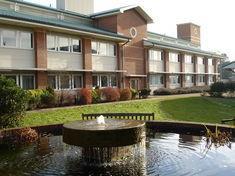
The row over the future of research station Warwick HRI has reached parliament, amid conflicting arguments over food and financial security.
Former DEFRA food and farming minister Jane Kennedy tabled an Early Day Motion to halt the redundancy process at the research centre, with its studies deemed vital.
Kennedy told MPs that the Midlands centre needed to remain open, to help the UK face the challenges of increasing production and battling climate change and environmental degradation.
Warwick HRI, currently based in Wellesbourne, is to be brought under the umbrella of the main campus Biological Sciences department by 2012 to create the School of Life Sciences (SLS) at the University of Warwick, with some of HRI’s glasshouses and fields set to be lost.
The move was announced in November and branded “scientific vandalism” by Nigel Titchen, vice-president of the union Prospect, who believes that the university will “wreck important global work” on food security.
DEFRA secretary Hilary Benn has scheduled, and cancelled, two meetings with the SLS’s interim head Professor Stuart Palmer, but Warwick representatives have conversed with Kennedy, chair of the All-Party Parliamentary Group on Science & Technology and her compatriot in the group, Lord Taylor.
It is thought that the meeting with Benn will now take place in May - perilously close to the distraction of a general election - but sources at the University of Warwick are hopeful that it will go ahead.
Peter Dunn, head of communications at the University of Warwick, told freshinfo: “The fact is Warwick HRI has been running with seven-figure losses for a number of years. There is a number of places we would expect funding to come from and we are not getting enough financial support.
“We are not a huge business focused on shareholders and profit - our mission is simply excellent research and teaching but that has to be sustainably funded.
“We are committed, however, to ensuring that the school [of Life Sciences] has access to the facilities needed to take forward its work. In this context, we are committed to research activity continuing at Warwick HRI’s current site in Wellesbourne until at least 2012, with decisions beyond that point being confirmed once the emerging public and other stakeholder positions are clarified.
“We do understand the current constraints on the secretary of state’s diary, and we will continue to consult with DEFRA officials, but we would have valued the opportunity to discuss directly with the minister.”
The university is also canvassing external stakeholders as to whether an industry-facing crop science research facility at Wellesbourne could be supported and sustained.
The university has asked Professor Tim Jones, the deputy chair of the university’s Faculty of Science, to investigate the viability of such a facility working with stakeholders and relevant staff.
Over the last few months, the university has been consulting with a range of interested parties including funding councils, the Horticultural Development Company, the National Farmers’ Union and others on this initiative.
This investigation will confirm or challenge the sustainability of such a unit and the level of external support it could expect. Jones advised a meeting of external stakeholders in March that he intends to report on that possibility back by the end of April. The university will consider any options arising from this investigation as quickly as possible once they are received.